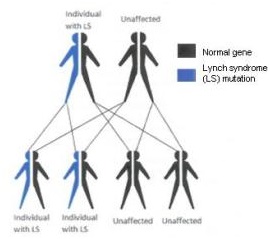Lynch Syndrome Causes, Symptoms, Diagnosis and Treatment

What Is Lynch Syndrome?
Lynch syndrome, also known as hereditary nonpolyposis colorectal cancer, is an autosomal dominant condition.
An autosomal dominant condition is a relationship of alleles of one gene, where one allele masks the contribution of the second allele.
Lynch syndrome is known to increase the risk of developing colon cancer and is dubbed to be a type of cancer syndrome.
A cancer syndrome is a genetic disorder in which inherited genetic mutations in one or more genes predispose the affected individuals to the development of cancers and may also increase the risk of early onset of these cancers.
Apart from colon cancer, lynch syndrome also causes predisposition to a variety of other types of cancers including endometrial cancer, ovary, stomach, small intestine, hepatobiliary cancer etc.
The increased risk of these cancer is associated with the inherited mutation which is the underlying cause of lynch syndrome.
Causes Of Lynch Syndrome:
Lynch syndrome is a hereditary disease i.e. it runs in families in an autosomal dominant inheritance pattern.
Lynch syndrome causes cancer since the genetic mutation which is acquired as result of lynch syndrome tends to cause mismatch repair genes.
People with the mutated gene tend to lack the ability to repair minor mistakes in the cells. These mistakes may accumulate to cause cell damage which in turn may result in the cells becoming cancerous.
Symptoms Of Lynch Syndrome:
People with lynch syndrome may exhibit the following symptoms:
- Onset of colon cancer at a younger age
- A family history of colon cancer that occurs at a young age
- A family history of endometrial cancer
- A family history of other related cancers
- ovarian cancer
- kidney cancer
- stomach cancer
- small intestine cancer
- liver cancer
- sweat gland cancer
Diangosis Of Lynch Syndrome:
Lynch syndrome can be diagnosed via:
- Medical history
- Tumor testing, to detect whether cancer was caused by lynch disease
- Immunohistochemistry (IHC) testing
- Microsatellite instability (MSI) testing.
- Genetic testing
Treatment Of Lynch Syndrome:
The following treatment options are available:
- Surgery
- To remove the entire colon
- To remove ovaries and uterus
- 5-fluorouracil-based adjuvant therapies
- Aspirin, to prevent cancer
- Cancer screening to identify the type of cancer, which is followed by:
- Radiation therapy
- Chemotherapy
By : Natural Health News




